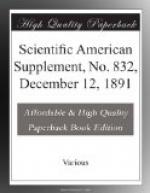BELGIUM.
If fresh cossettes are fed to cows, in quantities per diem representing 20 per cent. of the animal’s weight, they have a thinning effect. When the refuse has been siloed for eight months, and 12 per cent. of the animal’s weight is used, there will follow a slight daily increase in weight. Better results may be obtained from cossettes that have been kept for two years; with the latter, if cows eat only 7 per cent. of their weight, considerable fattening follows. Consequently, while beet refuse, after long keeping, loses 50 per cent. of its weight, it appears in the end to be more economical for feeding purposes than fresh cossettes direct from the battery.
During this period of keeping the percentage of water remains nearly constant; fatty substances which were 0.08 per cent. become 0.74; and the percentage of carbohydrates diminishes. Chemists are unable to explain the changes that have taken place; if they are desirable, as they appear to be, judging from the practical results just cited, there is this question to be solved: What future have dried cossettes? Evidently they offer advantages, as no one can doubt, such as a decrease in weight and bulk, easy keeping for an indefinite time, etc. At present, there is building a silo to contain 4,000 tons fresh cossettes; this is to have the best possible system of drainage. During the coming season it is proposed to analyze the water draining from this mass of fermenting refuse; and we may then learn more than we now know about the chemical changes above mentioned.
A correspondent of M. Sachs asks why it is not possible to use live steam in defecating tanks. A simple calculation shows that the water to be subsequently evaporated would be increased 10 per cent. This evaporation would cost more than cleaning of copper coils, etc., combined with other difficulties existing appliances offer.
The question as to the most desirable number of beets necessary to analyze to obtain an average has been in part settled. Factories working 500 tons per diem should make at least 200 analyses of beets received, which work offers no difficulty by the rapid methods now used. Several samples should be taken from every cart load delivered, then make average selections from the same.
RUSSIA.
Weak currents of electricity, 0.03 to 0.04 ampere, have been passed through sirups for fourteen hours without any special increase in purity coefficient. Experiments made upon diluted molasses or with raw beet juices were not encouraging.
Mixing of filter press scums with diffusion juices is said to offer special advantages for the preliminary purification. Not over one to two per cent. of scums should be used. If in too great quantity, the raw juices will yield inferior results. During operations that follow, experiments are not yet sufficiently advanced to determine with certainty within what limits the refuse scum utilization process is to be recommended. We have great doubts as to the wisdom of introducing foreign elements, eliminated from other juices in a previous operation, into a juice fresh from the battery.




